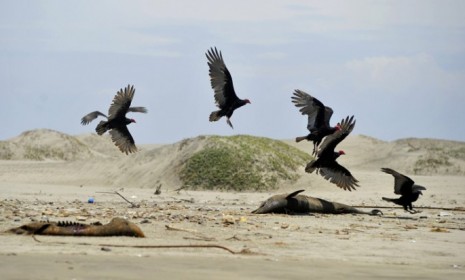Why are dolphins beaching themselves? 4 theories
Scientists aren't sure why the beloved marine mammals are getting stranded in unprecedented numbers this winter. But they have a few ideas

A free daily email with the biggest news stories of the day – and the best features from TheWeek.com
You are now subscribed
Your newsletter sign-up was successful
From New England to Peru, dolphins have been beaching themselves in unprecedented numbers in recent weeks. More than 177 short-beaked dolphins have been stranded on Massachusetts' Cape Cod — more than five times the normal annual number — and 124 have died. Researchers have screened the marine mammals for bacteria and viruses, analyzed tissue samples, and put tracking devices on some survivors released back into the sea, looking for a cause. "Gosh, it's a puzzle," biology professor Richard Connor tells The Boston Globe. "It's really strange." What's going on? Here, four theories:
1. Some coves and bays routinely trap dolphins
"Dolphins do wash up on Cape Cod," says Michele Wilson Berger at Audubon magazine. "In fact, it's one of the three most common spots for this to happen, along with places in Australia and New Zealand." It's "believed to be a natural consequence" of geography, says Joanna M. Foster in The New York Times. "Around the globe, hook-shaped capes appear to effectively channel dolphins and other animals into large shallow bays that experience large tides," which could explain why dolphin beachings have been reported in Cape Cod Bay since the days of the Pilgrims.
The Week
Escape your echo chamber. Get the facts behind the news, plus analysis from multiple perspectives.

Sign up for The Week's Free Newsletters
From our morning news briefing to a weekly Good News Newsletter, get the best of The Week delivered directly to your inbox.
From our morning news briefing to a weekly Good News Newsletter, get the best of The Week delivered directly to your inbox.
2. It was something they ate
More than 200 dead dolphins have washed up on beaches in Chiclayo, Peru. But a potential clue — dead anchovies — has washed up beside them. Dolphins eat the tiny fish, leading the Peruvian Sea Institute to theorize that whatever killed the anchovies "could have poisoned the dolphins," says Liz Klimas at The Blaze.
3. Humans might be to blame
With no obvious culprit, scientists aren't ruling anything out, including explanations linked to humans. Man-made climate change, for instance, may have driven dolphins' prey into unfamiliar waters. The use of naval sonar could also be a factor. "We don't have that single answer," International Fund for Animal Welfare rescue and research manager Katie Moore tells the Cape Cod Times. "We want to look into every possible cause."
A free daily email with the biggest news stories of the day – and the best features from TheWeek.com
4. Maybe it's the weather
This year's unusually warm winter is affecting everything from animal reproductive cycles to hibernation patterns on land. "The change could also somehow be impacting dolphins," says Jennifer Viegas at Discovery News. "Unusual weather... is likely the main driving force, even if it is fueling some other secondary problems, such as the emergence of pathogens."
-
 How to Get to Heaven from Belfast: a ‘highly entertaining ride’
How to Get to Heaven from Belfast: a ‘highly entertaining ride’The Week Recommends Mystery-comedy from the creator of Derry Girls should be ‘your new binge-watch’
-
 The 8 best TV shows of the 1960s
The 8 best TV shows of the 1960sThe standout shows of this decade take viewers from outer space to the Wild West
-
 Microdramas are booming
Microdramas are boomingUnder the radar Scroll to watch a whole movie